Learning to Learn

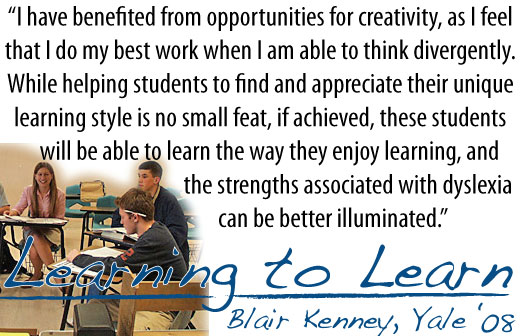
Supporting a student with dyslexia should be no different from supporting any student. Ideally, parents and teachers would nurture each young person as someone with a unique way of thinking, learning, and interacting with the world. Since students with dyslexia face additional challenges in the area of reading and writing, it is important to be especially sensitive to these individual differences, as they can gravely affect academic, social, and emotional aspects of a person’s life. With a proper understanding of the complexities of dyslexia, dyslexic individuals, their parents, and teachers will begin to appreciate that their unique learning challenges are often coupled with immense strengths.
I am one of these dyslexic individuals. I encourage teachers, administrators, and parents first and foremost to listen carefully to the person with dyslexia. While all dyslexic students are classified under the same umbrella term, they will likely have unique ways of compensating for their reading disability. Therefore, there is never one simple answer for how these students should approach learning in school.
Understanding one’s own dyslexia is a learning process in itself, 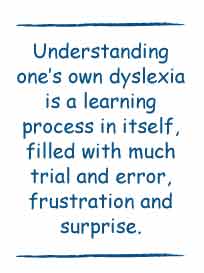 filled with much trial and error, frustration, and surprise. In middle school, I found that I had a talent for poetry and that I could organize my thoughts more easily if I did not have to fit words into sentences and paragraphs. In college, I surprised myself with my ability to find meaning in visual imagery. Art provided me with a fortuitous prompt, with which I could easily generate ideas and facilitate word retrieval. The challenge for anyone with dyslexia is in finding the way one learns best. But this takes time and, when faced with the intense pressures of school, a dyslexic student can become frustrated and discouraged along the way.
filled with much trial and error, frustration, and surprise. In middle school, I found that I had a talent for poetry and that I could organize my thoughts more easily if I did not have to fit words into sentences and paragraphs. In college, I surprised myself with my ability to find meaning in visual imagery. Art provided me with a fortuitous prompt, with which I could easily generate ideas and facilitate word retrieval. The challenge for anyone with dyslexia is in finding the way one learns best. But this takes time and, when faced with the intense pressures of school, a dyslexic student can become frustrated and discouraged along the way.
 Parents and teachers can never overestimate how valuable their support can be. Support can often make the difference between a talented student who sees himself as unintelligent and one who believes in his potential and therefore finds creative ways to approach the demands of school. One avenue for this support is by understanding the importance of proper accommodations. When I began to receive extra time on tests, I felt that my mind had time to generate ideas during the exams themselves. I did not have to memorize word for word what I wanted to say beforehand, allowing me to focus more on the concepts and less on wording.
Parents and teachers can never overestimate how valuable their support can be. Support can often make the difference between a talented student who sees himself as unintelligent and one who believes in his potential and therefore finds creative ways to approach the demands of school. One avenue for this support is by understanding the importance of proper accommodations. When I began to receive extra time on tests, I felt that my mind had time to generate ideas during the exams themselves. I did not have to memorize word for word what I wanted to say beforehand, allowing me to focus more on the concepts and less on wording.
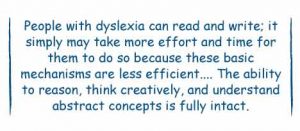
A second way to help students with dyslexia is by understanding that having dyslexia does not mean that a person is “bad” at reading and writing. Rather, it often means that the basic components of reading and writing that involve phonics ability—such as spelling, reading speed, and word recognition—are impaired. People with dyslexia can read and write; it simply may take more effort and time for them to do so because these basic mechanisms are less efficient. What is important to keep in mind is that the ability to reason, think creatively, and understand abstract concepts is fully intact. Often, their ability to glean new meaning and make important connections between ideas is strengthened as a result of the phonological deficit.
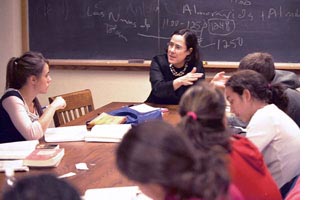
The exciting challenge for students, parents, and educators is in finding ways that dyslexic individuals can learn and express their ideas without feeling impeded by a deficit at the lowest level of the language system. In my own life, I have benefited from opportunities for creativity, as I feel that I do my best work when I am able to think divergently. While helping students to find and appreciate their unique learning style is no small feat, if achieved, these students will be able to learn the way they enjoy learning, and the strengths associated with dyslexia can be better illuminated.
Related

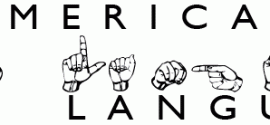
One Dyslexic’s Experience with Learning American Sign Language
CJ found learning ASL fairly easy. In each class he was given 45-50 vocabulary words to learn.
Read More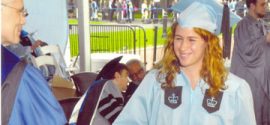
How Extended Time Improved More than Just Test Scores
Allison at her graduation from Columbia University, where she earned her master’s degree. Learning is not a game …
Read More
Giving Voice to a Young Person’s Dyslexia Journey
Jennifer realized she could help other kids—and their parents—by telling her own story, the story of a 12-year-old …
Read More